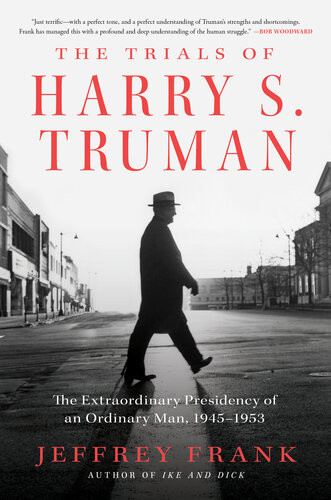

Most ebook files are in PDF format, so you can easily read them using various software such as Foxit Reader or directly on the Google Chrome browser.
Some ebook files are released by publishers in other formats such as .awz, .mobi, .epub, .fb2, etc. You may need to install specific software to read these formats on mobile/PC, such as Calibre.
Please read the tutorial at this link: https://ebookbell.com/faq
We offer FREE conversion to the popular formats you request; however, this may take some time. Therefore, right after payment, please email us, and we will try to provide the service as quickly as possible.
For some exceptional file formats or broken links (if any), please refrain from opening any disputes. Instead, email us first, and we will try to assist within a maximum of 6 hours.
EbookBell Team

4.1
80 reviewsThe nearly eight years of Harry Truman's presidency—among the most turbulent in American history—were marked by victory in the wars against Germany and Japan; the first use of an atomic weapon; the beginning of the Cold War; creation of the NATO alliance; the founding of the United Nations; the Marshall Plan to rebuild the wreckage of postwar Europe; the Red Scare; and the fateful decision to commit troops to fight in Korea.
Historians have tended to portray Truman as stolid and decisive, with a homespun manner, but the man who emerges in The Trials of Harry S. Truman is complex and surprising. He believed that the point of public service was to improve the lives of one's fellow citizens, and was disturbed by the brutal treatment of African Americans. Yet while he supported stronger civil rights laws, he never quite relinquished the deep-rooted outlook of someone with Confederate ancestry reared in rural Missouri. He was often carried along by the rush of events and guided by men who succeeded in refining his fixed and facile view of the postwar world. And while he prided himself on his Midwestern rationality, he could act out of emotion, as when, in the aftermath of World War II, moved by the plight of refugees, he pushed to recognize the new state of Israel.
The Truman who emerges in these pages is a man with generous impulses, loyal to friends and family, and blessed with keen political instincts, but insecure, quick to anger, and prone to hasty decisions. Archival discoveries, and research that led from Missouri to Washington, Berlin and Korea, have contributed to an indelible, and deeply human, portrait of an ordinary man suddenly forced to shoulder extraordinary responsibilities, who never lost a schoolboy's romantic love for his country, and its Constitution.